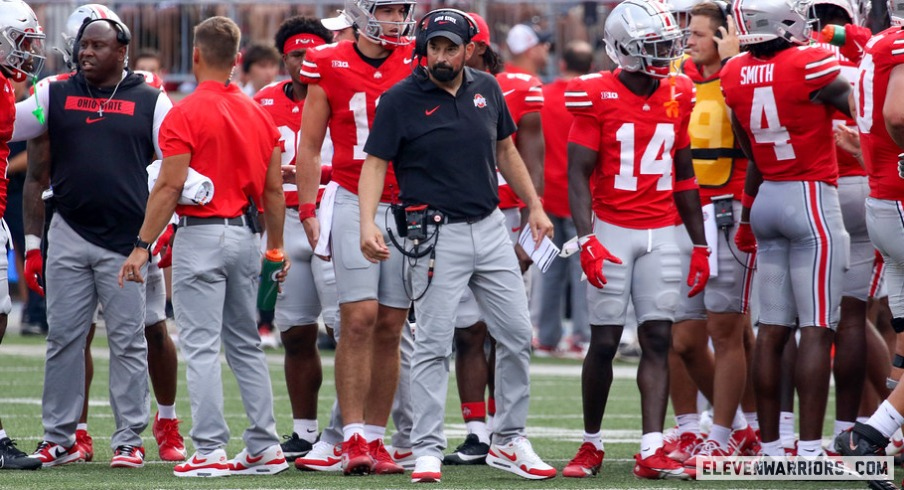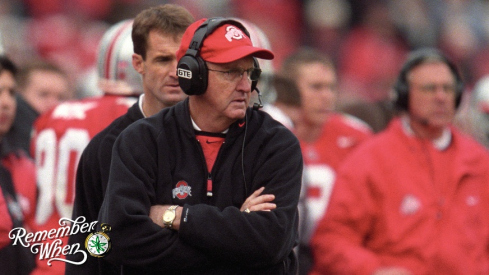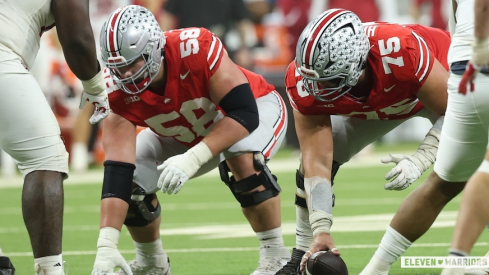There’s a lot of newness in how Ohio State’s offensive plays are called and adjusted in 2024.
The most obvious shift is in the man dialing things up, which changed out of Ryan Day’s hands for the first time since 2017 when arrived as co-offensive coordinator and quarterbacks coach under Urban Meyer. Offensive coordinator Chip Kelly is now running the show.
Another new factor is the implementation of in-helmet communication and the use of iPads on the sideline to review game footage in real time. Kelly relays calls to quarterback Will Howard and defensive coordinator Jim Knowles does the same to his Mike linebackers from the booth in real time.
“It's different,” Day said. “You can see a lot more teams are huddling in Week 1, which I thought would be the case. It was good. But there's still an element of the no-huddle that everyone's using. So there’s a kind of hybrid, I think, of some people using it and some people still signaling and doing those things based on who you're playing. But I think it's a great thing for college football, and we're all adapting. I thought it went well in Week 1.”
Day and the Buckeyes got their first chance to manage all those new moving parts during their 52-6 win over Akron, and while kinks in the system are still being untangled, things went about as smoothly as they could have gone in Week 1.
“It was good,” Day said. “Chip had his mind set on what he wanted to get done in this game. It was a start, long way to go. But overall, the calls came in quickly, and I thought overall that part was good. We still want to be clean across the board. I think we can be cleaner across the board. ... I think we can get in and out of the huddle faster. We can just sharpen everything that we're doing, but just in terms of the operation of calling a game and all that, it was clean in Week 1.”
Day’s surrendering of play-calling duties was one of the biggest talking points for Ohio State this offseason.
First hiring then-New England Patriots offensive coordinator Bill O’Brien to fill the role for 2024, Day turned to Kelly, UCLA’s head coach and his personal mentor, when O’Brien bolted to take Boston College’s open head coaching job. The goal for Day was to become more of a program CEO who could be involved not just in the offense but in all phases of the game. He felt that impact against the Zips.
“With special teams, just being more involved with it with Rob (Keys), making sure the right guys are in there, what the calls are,” Day said. “Then being there on defense to just encourage the guys and be around them. I did enjoy that part of it.”
For Kelly’s part, it’s the first time he’s been an offensive coordinator and not a head coach since 2008. That’s also the last time he coached a game from the booth and not from the field of play.
“Every time we've gone to the stadium, we've had an opportunity to do that, so kind of got settled and familiar up there,” Kelly said. “It's a great view. I think as the games get into October and November, people are going to be a little bit jealous of where I get to be on game day and not on the sideline.
“You're not right next to the coaching staff on the field, but we had no issues from a communication standpoint, the ability to communicate that. It was good. It's a different perspective. I think you can see the game better from up top. And I think you can feel the game better from the field. And I don't think that will ever change.”
Kelly still felt Day’s input from his bird's eye vantage point. But so too did Knowles and Keys, who is overseeing Ohio State’s special teams this year.
“He was great,” Kelly said of Day. “There were a couple of suggestions that we ran and were good. Then (he’d say), ‘Hey, let's get to this.’ ... The communication in between what (the players) are doing, what we think they're doing. Changing speeds, changing tempos, some of those things, I thought he did a really good job. But he's involved with the defense with Jim and he's involved in the special teams with all the special teams guys, too.”
On offense, they’re all relaying their messages to Howard, who wears the green dot for the Buckeyes as their in-helmet receiver. He can’t communicate back with staff, so it’s a one-way line.
“We can just sharpen everything that we're doing, but just in terms of the operation of calling a game and all that, it was clean in Week 1.”– Ryan Day on Ohio State's new play-calling operation
While coaches have until 15 seconds remaining on the play clock to commune with players, Kelly said that he and other coaches don’t spend all that time talking to Howard on the field. They establish the game situation, figure out the play call and then either communicate that to the quarterback to tell the rest of the team in the huddle or have the sideline signal it in if there is no huddle.
The goal is to get the play in as early as possible so that Howard has time to read the defense and make checks or change the call at the line of scrimmage if needed.
“We've been working with it since spring, so it's not really a new thing that we have had to deal with,” Howard said. “Obviously this year it's new, but we've been doing it for pretty much the whole time I've been here. So it is new, but for it being the first game, I think we did pretty well with it. I obviously can't speak back to him, so he doesn't know when I've heard it or what I've heard or if it cuts out or anything like that. But we're working through those. We have hand signals, if I throw my hands up, I can't hear you. It's like little things like that.”
Howard can watch game footage on the sidelines with his teammates and coaches now that iPads have been implemented. Folks on the field can get a perspective of the all-22. It's another change that will take time to adjust to, but should soon provide a major edge for those teams deploying it properly.
“You can kind of see what's going on during the game and get a feel for exactly what you're seeing,” Day said. “That is new. You didn't really have that before. You're really relying on the guys up in the box to give you information. Your eyes can sometimes deceive you down in the field. Now you're able to confirm what you think you saw, make adjustments, and have the communication to the players in that moment.”
With any luck, Ohio State’s offensive play-calling operation will be even cleaner against Western Michigan this Saturday.


